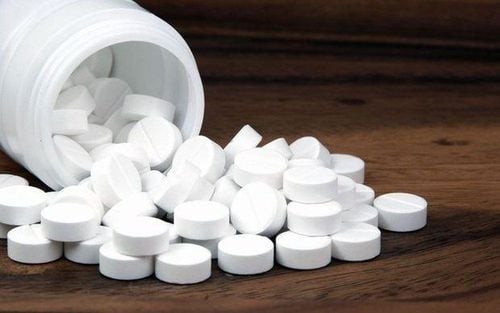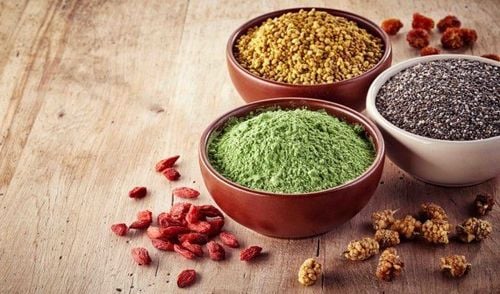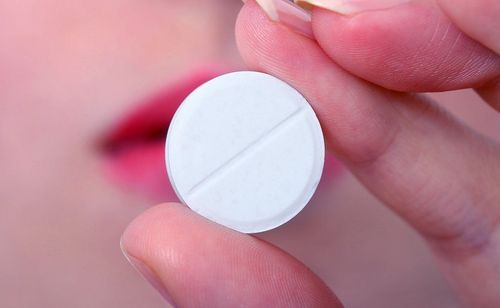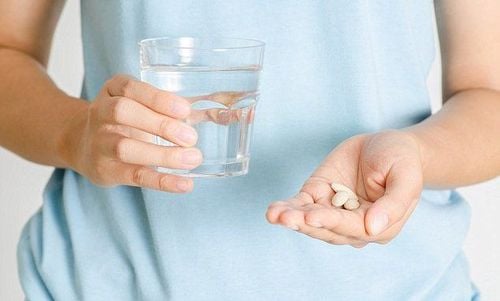This is an automatically translated article.
Spirulina is a blue-green algae that people can take as a dietary supplement. People consider spirulina a superfood due to its amazing nutritional content and health benefits. Spirulina is high in protein and vitamins, making it a great dietary supplement for vegetarians. Numerous studies have demonstrated spirulina to have antioxidant and anti-inflammatory properties, as well as the ability to help regulate the immune system.
1. What is spirulina?
Spirulina is one of the most popular foods in the world. Spirulina is blue in color, grows in both freshwater as well as saltwater ecosystems and can be easily added to a person's daily diet. Many people consider spirulina an amazing food due to its nutrient content as well as its health benefits.
Spirulina has a very high protein and vitamin content, along with other nutrients and antioxidants that are especially beneficial for the brain. All of the above makes spirulina a perfect food for any diet, especially for vegetarians.
Many studies have shown that spirulina has anti-inflammatory properties as well as the ability to enhance the body's immune system.
Trắc nghiệm dành riêng cho người mắc đái tháo đường: Chế độ ăn của bạn đã hợp lý chưa?
Người bị bệnh đái tháo đường cần phải quan tâm nhiều hơn đến cách tính toán khẩu phần ăn sao cho phù hợp với nhu cầu và tình trạng sức khỏe. Nếu chưa rõ, bạn có thể tìm hiểu kỹ hơn thông qua bài trắc nghiệm ngắn sau đây.2. 10 health benefits of spirulina (Spirulina) 2.1. Diverse nutrient content Spirulina is actually a bacterium of the cyanobacteria family – a single-celled bacterium. Like plants, spirulina in particular and cyanobacteria in general can generate energy from sunlight through photosynthesis. Spirulina was widely consumed by the ancient Aztecs, but became most popular when the US Space Agency (NASA) proposed to grow them in space ships to partially serve the food needs of the astronauts. astronaut. The recommended daily dose of spirulina ranges from 1-3 grams, however, in many studies, doses of up to 10 grams of spirulina have no effect on health.

Tảo xoắn chứa hàm lượng chất dinh dưỡng đa dạng
Spirulina contains a lot of essential nutrients. Each tablespoon of dried spirulina powder equivalent to approximately 7 grams contains:
Protein : 4 grams Vitamin B1 : 11% of Recommended Daily Needs Vitamin B2 : 15% of Recommended Daily Needs Vitamin B3 : 4% of Recommended Needs DV Copper: 21% of DV Iron: 11% of DV Spirulina also contains relatively large amounts of magnesium, potassium, manganese and a number of other essential nutrients and minerals. . In addition, each 7 grams of spirulina provides about 20 calories and 1.7 grams of carbohydrates. In terms of nutrient content, it's hard to find any food that beats spirulina in terms of nutrition.
In terms of fat content, each 7 grams of spirulina contains about 1 gram of fat, which includes both omega-3 fatty acids and omega-6 fatty acids in an approximate 1-1.5 times ratio. The protein quality in spirulina is also considered excellent, even comparable to the protein in eggs. Spirulina provides almost all the essential amino acids that the body needs.
Many people think that spirulina contains vitamin B12 but this is not true. In fact, spirulina contains a nutrient called pseudo vitamin B12 and they do not provide the same effects as vitamin B12.
2.2. Powerful antioxidant and anti-inflammatory properties Oxidation can cause damage to cells as well as DNA genetic material leading to chronic inflammation, especially cancer. Spirulina is a great source Excellent antioxidant food with phycocyanin as the main ingredient. Phycocyanin has the ability to neutralize free radicals, thereby minimizing the damage that oxidation brings, they are also the substance that creates the unique blue color of spirulina. In addition, phycocyanin also has effective anti-inflammatory properties.
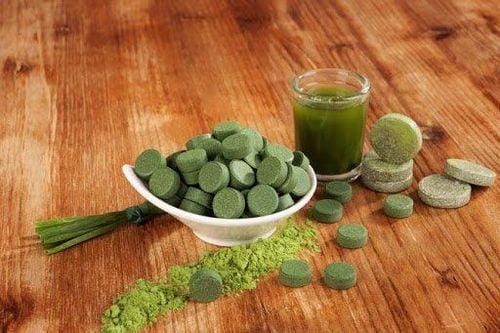
Tảo xoắn có thể chống oxy hóa và chống viêm mạnh mẽ
2.3. Reduces levels of harmful triglycerides and cholesterol Cardiovascular diseases are the leading cause of death in the world. There are many factors that can increase the risk of cardiovascular diseases including high levels of triglycerides as well as cholesterol in the blood. Spirulina in turn has a positive effect on these factors. They can lower total cholesterol, bad cholesterol (LDL cholesterol), triglycerides, and increase good cholesterol (HDL cholesterol).
In a study of 25 people with type 2 diabetes, taking 2 grams of spirulina daily was able to significantly improve problems that are a risk factor for cardiovascular disease. Another study in people with high blood cholesterol showed that taking 1 gram of spirulina per day can reduce triglycerides by 16.3% and bad cholesterol by 10.1%.
2.4. Protects cholesterol against oxidative attack Fat structures in the body are easily damaged by oxidation, also known as lipid peroxidation. Lipid peroxidation is the cause of a number of serious chronic diseases
A good example can be mentioned that the progression of heart disease is closely related to the peroxidation of bad cholesterol (LDL cholesterol). Interestingly, the antioxidants in spirulina seem to be effective in reducing lipid peroxidation, especially bad cholesterol, in both humans and animals. In a study in 37 people with type II diabetes, supplementing with 8 grams of spirulina powder per day was able to significantly reduce markers of oxidative damage. It can also increase blood levels of enzymes involved in antioxidant processes.
2.5. Anti-cancer properties Some evidence suggests that spirulina has anti-cancer properties. Animal studies have shown that spirulina has the ability to reduce the appearance of cancer cells as well as limit the growth of tumors.
An Indian study of 87 people developed precancerous lesions called fibrosis of the oral mucosa. They were given 1 gram of spirulina daily for 1 year and found that 45% of the lesions disappeared compared with only 7% in the control group. When these subjects stopped taking spirulina, nearly half of them continued to develop these lesions the following year.
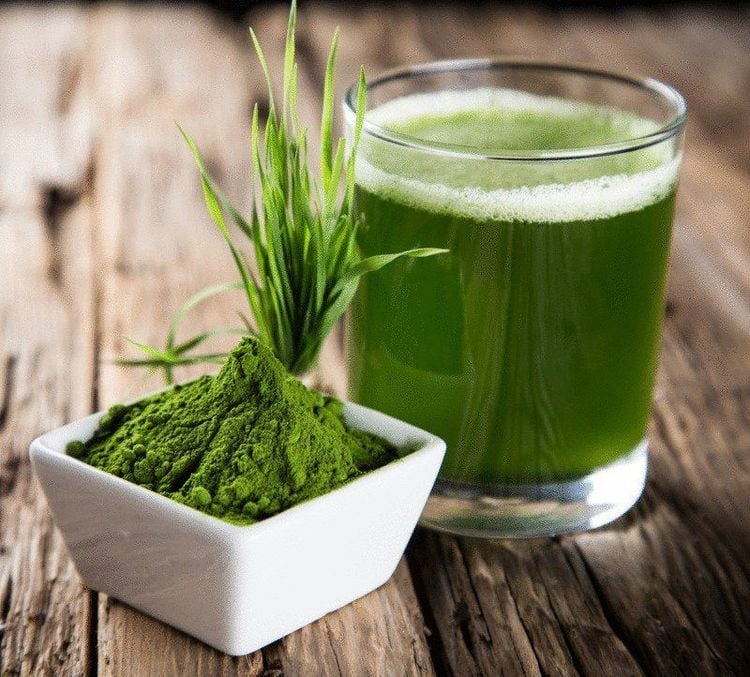
Sủ dụng tảo xoắn có thể giúp người dùng phòng chống ung thư
2.6. Lowers blood pressure High blood pressure is a major cause of many serious illnesses including heart attacks, strokes, and other chronic diseases.
A daily dose of 4.5 grams of spirulina has been shown to be effective in lowering blood pressure readings in people with normal blood pressure levels. This is thought to be because the action of spirulina leads to an increase in the production of nitric acid - a substance that has a vasodilator effect, increasing circulation.
2.7. Allergic Rhinitis Allergic Rhinitis is caused by allergens in the environment such as pollen, animal dander or dust.
Spirulina is a popular alternative treatment for people with symptoms of allergic rhinitis and has been shown to be highly effective. In a study in 127 people with allergic rhinitis, a daily supplement of 2 grams of spirulina significantly reduced symptoms of the disease such as runny nose, sneezing, stuffy and itchy nose.
2.8. Prevention of anemia The most common type of anemia today is a decrease in the concentration of hemoglobin and red blood cells in the blood. Anemia is common in the elderly, making the patient always feel tired.
In a study in 40 older adults with a history of anemia, daily spirulina supplementation was found to increase hemoglobin content in red blood cells and significantly improve immune system function.
2.9. Improves Muscle Strength and Endurance Oxidation from exercise can lead to muscle fatigue. Certain foods with antioxidant properties, including spirulina, have been used by people who are physically active to reduce this condition.
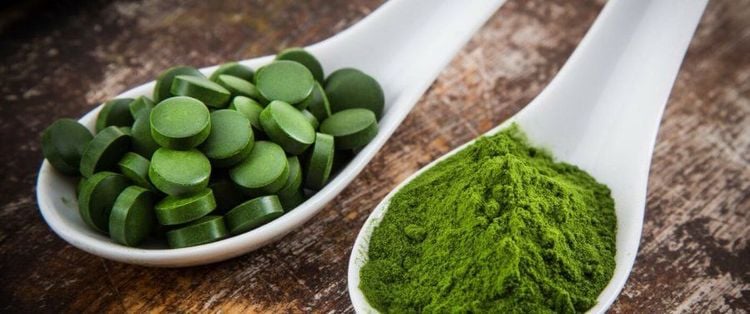
Tảo xoắn có thể giúp người luyện tập cải thiện sức mạnh và sức bền của cơ bắp
In many high-precision studies, spirulina has been shown to improve muscle strength and endurance. This is especially good for athletes.
2.10. Supports blood sugar control Animal studies have shown spirulina can significantly reduce blood sugar levels. In some cases, the effects of spirulina are even superior to those of today's popular diabetes drugs.
There is also ample evidence that spirulina is also effective in humans. In a two-month study in 25 people with type 2 diabetes, taking 2 grams of spirulina per day caused their blood sugar to drop significantly. In addition, the amount of HbA1c - a sign of high blood sugar also decreased from 9% to 8%. This is a relatively significant reduction considering that a 1% decrease in HbA1c levels can reduce the risk of death from diabetes by 21%.
Spirulina is a type of bacteria belonging to the cyanobacteria family, which is very good for health. Spirulina can improve blood fat in a positive way, inhibit oxidation, reduce blood pressure and glycemic index. Although more research is needed to further prove the effects of spirulina, spirulina is undeniably the most nutritious food on the planet.
Please dial HOTLINE for more information or register for an appointment HERE. Download MyVinmec app to make appointments faster and to manage your bookings easily.
References: medicalnewstoday.com, healthline.com




